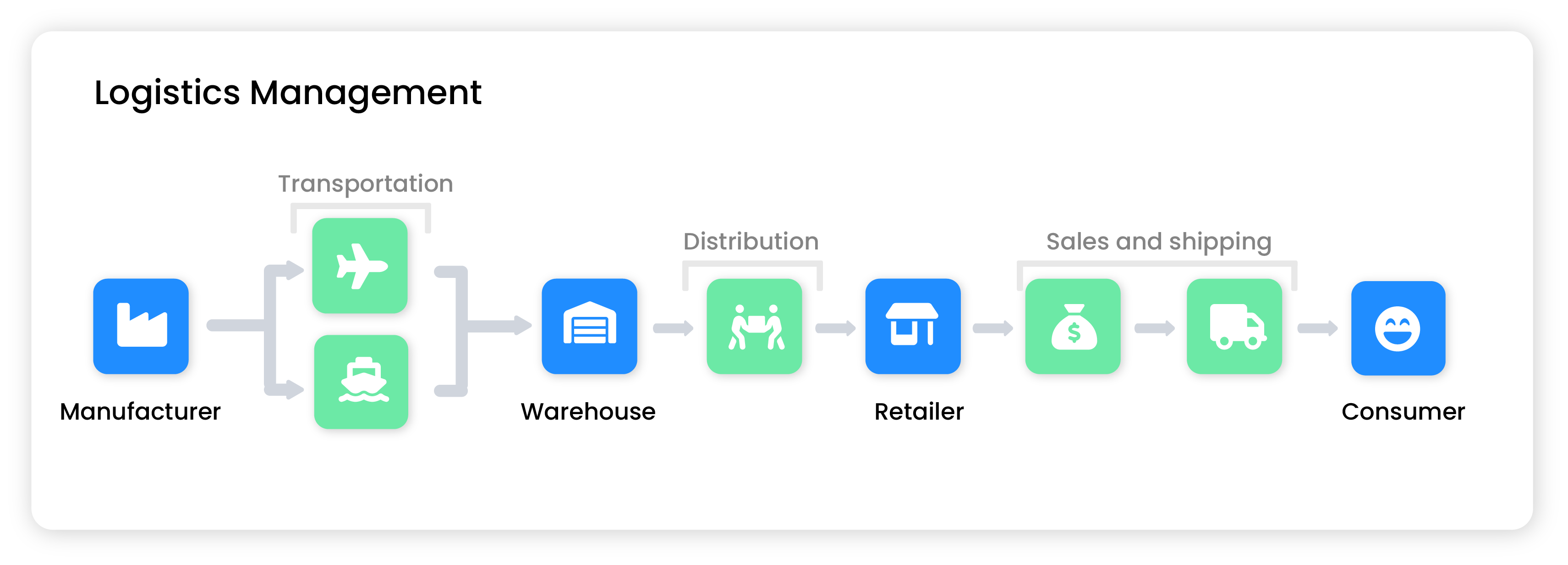What is Logistics Management?
Logistics lies at the core of a fundamental concept: the intricate processes involved in facilitating the smooth movement of goods from sellers to buyers. As such, the orchestration of logistics demands astute oversight from managers and professionals responsible for the logistics system within organizations.
Their expertise navigates through a myriad of complexities that arise during this journey, and the recognition of their proficiency is evidenced by the availability of diverse certifications tailored to their specialized skills.
The triumph of transportation logistics hinges upon multifaceted effectiveness, encompassing crucial aspects like discerning optimal routes that balance convenience for both the company and the customer, meticulous adherence to regulatory environments, and adeptly circumventing and resolving obstacles, from road repairs to adversities caused by weather conditions.
Within the realm of transportation logistics and logistics services, profound consideration must be bestowed upon the selection of shipping providers, epitomized by the role of drivers, as well as the judicious choice of packaging options.
This decision-making process deftly balances costs against an array of factors, spanning from weight considerations to the establishment of sustainable logistics practices over time.

Fortuitously, contemporary advancements in transportation management software have bestowed valuable tools upon companies, empowering them to make informed routing and shipping decisions. This technological boom leads to cost reductions, safeguarding of investments, and the seamless tracking of goods as they move through the logistics network.
Additionally, modern transportation management systems, exemplified by the likes of Drivin, embrace automation as a driving force for both logistical and reverse logistical processes.
Importance of Logistics in Operational Efficiency
Optimized logistics processes offer a myriad of significant benefits, with operational efficiency reigning supreme among them.
The efficiency brought about by seamless logistics operations permeates throughout the supply chain, leading to gains in various facets:
Enhanced Inventory Management
Logistics empowers companies to wield precise control over their inventory, mitigating the risk of stockouts and excess holdings. This, in turn, curtails the cost of maintaining inventory and diminishes the risk of obsolescence.
Refined Transportation Planning
Logistics serves as a catalyst for refining transportation operations, culminating in reduced transportation costs and accelerated delivery speed. Moreover, it adeptly steers clear of delays and other transportation-related predicaments, thus elevating customer satisfaction to new heights.
Streamlined Order Fulfillment Process
The implementation of cutting-edge logistics management technology streamlines the order fulfillment process, diminishing the time required for picking, packing, and shipping products. This acceleration translates into swifter and more precise delivery times, thereby improving consumer satisfaction.
Augmented Supply Chain Visibility
Logistics software confers upon a company an invaluable gift—the power of supply chain visibility. This allows for meticulous tracking of goods and services from their genesis to their final destination. The revelation of inefficiencies and bottlenecks empowers the company to undertake requisite improvements.
Reduction of Operating Costs
The efficiency of logistics leads to a palpable reduction in operating costs by streamlining processes, minimizing waste, and fortifying efficiency, which, in turn, empowers businesses to preserve their competitive edge amid an increasingly volatile and challenging market landscape.

Overall, the essence of logistics lies in its meticulous planning, expert implementation, and masterful control over the movement and storage of goods and products. However, its profound impact extends far beyond these core functions.
In the realm of business, successful logistics bestows a plethora of advantages, including heightened efficiency and production rates, diminished costs, enhanced inventory control, judicious utilization of storage space, amplified customer, supplier and employee satisfaction, and ultimately, a superlative customer experience that engenders loyalty and stimulates word-of-mouth recommendations for the brand.
Each of the aforementioned factors exerts a direct influence on a company's business triumphs, not to mention the indispensability of a well-defined reverse logistics process to maximize the revenue derived from these goods.
What is Business Logistics?
Business logistics encompasses the art of meticulously orchestrating, executing, and regulating the seamless flow of goods and services from their inception to the hands of the ultimate consumer. This management domain entails multiple activities, ranging from the astute procurement of materials to the adept storage, transportation, inventory management, and precise distribution of products to valued customers.
In essence, the crux of business logistics revolves around the unwavering commitment to ensure the timely and efficient delivery of products or services, with a sharp focus on minimizing costs and attaining the zenith of customer satisfaction.
For any enterprise, the treasure trove of effective business logistics management holds the key to unlocking unparalleled operational efficiency. By nimbly navigating this realm, businesses can seamlessly reduce transportation and storage costs while adroitly aligning with the ever-changing tides of market demands.
Four Pillars for Efficient Logistics
There are several foundational pillars that companies can direct their efforts towards to achieve efficient logistics. The following key pillars are of particular importance:
Planning
Effective planning entails forecasting demand, managing inventory levels, and optimizing transportation routes. By engaging in meticulous planning, companies can ensure the right inventory is available at the right time and place while also minimizing transportation costs.
Information Management
Logistics involves handling a wealth of information, including tracking shipments, managing inventory levels, and coordinating with suppliers and customers. Implementing robust information management systems ensures that all stakeholders have the necessary data to make well-informed decisions and take prompt actions.
Infrastructure
Physical infrastructure, encompassing transportation, storage, and communication networks, plays a critical role in ensuring efficient logistics. Investing in modern and streamlined infrastructure helps expedite the transportation of goods while keeping costs under control.
Organization
Effective logistics management calls for a well-organized team with clearly defined roles and responsibilities. Fostered by seamless communication and collaboration among team members, this organized approach ensures that everyone works cohesively towards shared objectives.
Function of Logistics in Businesses
As previously mentioned, the role of logistics in a business is to facilitate the efficient movement of goods from their point of origin to end consumers. This movement can be categorized into two main types: goods moving from their point of origin to a manufacturer (B2B), and goods moving directly to an end customer (B2C).
With this in mind, there are six fundamental pillars that underpin an effective logistics process, applicable regardless of whether it is B2B or B2C:
Material Procurement
Material procurement in logistics encompasses the process of acquiring and supplying the materials needed for a company's production, maintenance, and business operations. It's a pivotal aspect of supply chain management, which aims to ensure the availability of the right materials at the right time, in the right quantity, and at favorable prices.
The stages involved in material procurement include:
- Identifying material requirements,
- Selecting reliable suppliers,
- Negotiating prices and favorable purchasing terms,
- Placing orders,
- Managing inventory.
Furthermore, it may also involve coordinating transportation and delivery logistics to ensure timely and efficient delivery of materials.
Transportation
Transportation stands as a cornerstone of logistics for any company, as it serves as the means by which products are moved from their place of origin to their final destination.
Storage
Effective logistics planning encompasses both short-term and long-term storage considerations. Additionally, warehouse management systems play a vital role in facilitating logistics planning.
For instance, logistics planners must account for warehouse space availability and special requirements based on the type of product to be stored, such as cold chain storage, and other specific needs.
Demand Forecasting
Logistics heavily relies on inventory demand forecasting to ensure that a company never faces stockouts of essential or high-demand products and avoids unnecessary capital tied up in slow-moving inventory.
Inventory Management
Through the application of inventory management techniques, companies can proactively plan for increased demand in products, allowing them to optimize profits and enhance inventory turnover.
For instance, effective inventory management enables the transfer of products with low sales volume from one store to another, thereby avoiding losses through offers and discounts to sell excess stock. Logistics plays a pivotal role in moving inventory to where it is most likely to generate the best value.
Supply Chain Management
Logistics represents a crucial link in the supply chain, as it facilitates the smooth movement of goods from suppliers to manufacturers, then to vendors or distributors, and ultimately to buyers.
Benefits and Scope of Logistics and Transportation
Given the vital role of logistics management and its significant impact on cash flow, it becomes imperative to equip businesses with the right tools and technology to ensure a seamless logistical process.
Here are four key benefits of effective logistics management:
Enhanced Visibility
Logistics management provides invaluable visibility into the entire supply chain. This heightened visibility empowers companies to exercise better cost control, unearth operational efficiencies, identify and address supply chain issues, proactively plan for demand, and gain valuable insights for strategic decision-making.
Reduction in Overheads
A crucial aspect of logistics management lies in its capacity to drive overhead reduction across various areas, encompassing shipping costs and optimizing storage space through proactive inventory level control.
Elevating Customer Experience
An exceptional customer experience stands as the linchpin of successful sales. By precisely and expeditiously fulfilling orders, logistics plays a pivotal role in elevating the customer experience, thereby fostering brand loyalty and boosting future sales.
Prevention of Losses
Logistics management serves as a potent shield against losses through various measures. One such measure is meticulous inventory accounting, enabling companies to maintain a real-time overview of available stock levels.
Additionally, companies can closely monitor the movement and current location of stock to preempt losses or diversion without prior notice.
Key Performance Indicators in Logistics
Logistics KPI play a pivotal role in identifying areas within the goods flow that demand improvement. Consequently, the significance of logistics KPI varies across different industries.
The process of selecting suitable logistics KPIs starts with discerning the business's position within a specific sector, followed by the selection of representative KPIs that align with the organization's goals.
Once the KPI are chosen, they are categorized according to different stages within the supply chain. Each stage is then assigned a few pertinent KPI that reflect the organization's industry standing and potential for enhancement.
List of Logistics KPI by stage:
When organizing logistics KPI according to stages, there might be some overlap between the stages, but the activities and metrics remain distinct, offering valuable insights into the business's performance in each area.
Order Management KPI
These KPI revolve around order processing and returns, which hold significant importance for reverse logistics. Their measurement commences when customers place an order.
Supply KPI
Focused on the smooth movement of final goods through the supply chain, these metrics contribute to operational efficiency improvement and business growth.
Inventory KPI
Measuring the efficacy of inventory production and procurement processes, these KPI also encompass cash flow and productivity aspects.
Distribution KPI
These KPI center around the system that manages the flow of products within the distribution network.
Transportation Management KPI
Governing the transportation of goods by truck, these KPIs provide valuable insights for enhancing operational effectiveness in transportation operations.
By effectively leveraging these logistics KPIs, businesses can gain a deeper understanding of their performance at each stage, facilitating informed decision-making and driving continuous improvement within the supply chain.
Customer Service in Logistics
Defining customer service within the realm of logistics can be a complex endeavor. However, when we discuss customer service and logistics, we are referring to a dedicated group of skilled individuals who serve as the face of the business during product deliveries.
Emphasizing a customer-centric approach, logistics ensures seamless communication and collaborative efforts in achieving the common objective of successful deliveries.
Consequently, a transportation provider, entrusted with product delivery, strives to provide exceptional customer service by adhering to the following principles:
1. Ensuring Transparency: Maintaining clear and open lines of communication between the company and the customer.
2. Timely Updates: Providing prompt status updates to keep customers informed throughout the delivery process.
3. Regular Communication: Engaging in regular interactions to address queries and requests promptly.
4. Responsiveness: Swiftly responding to inquiries and fulfilling customer demands.
5. Reliability: Honoring commitments and promises made to customers.
6. Integrity: Operating with transparency and honesty in all dealings.
7. Shared Goals: Aligning transportation goals with the customer's objectives for mutual success.
8. Proactive Solutions: Offering proactive solutions when challenges arise, ensuring seamless resolutions.
9. Continuous Improvement: Leveraging technology and data analysis to identify areas for improvement and deliver an enhanced customer experience.
By embracing these customer service principles within logistics, businesses foster strong relationships with customers, thereby fostering loyalty and advocating positive word-of-mouth recommendations for the brand.
The Dynamic Relationship Between Logistics and the Supply Chain
The interplay between logistics and supply chain management is ever-evolving, driven by the demands of modern consumers.
In today's fast-paced world, customers frequently use their smartphones to request products and expect lightning-fast deliveries within 24 to 48 hours. To meet these heightened expectations, companies must optimize the logistics within their supply chain, streamlining order fulfillment and dispatching products through reliable, cost-effective, and timely channels.
A well-crafted logistics plan is the key to success, ensuring each element within the logistics model remains laser-focused, cutting costs, and achieving swift and efficient movement of goods, ultimately leading to heightened customer satisfaction.
Logistics empowers companies to grasp critical metrics, streamline core processes, and set long-term supply chain goals, allowing them to deliver the right product to the right place at the right time.
In the face of logistics challenges hindering timely deliveries, a robust Transportation Management System (TMS) comes to the rescue. At Drivin, we excel in providing real-time logistics solutions. Leave us your information, and we will seamlessly address any obstacles that come your way.


.jpg)
.jpg)
